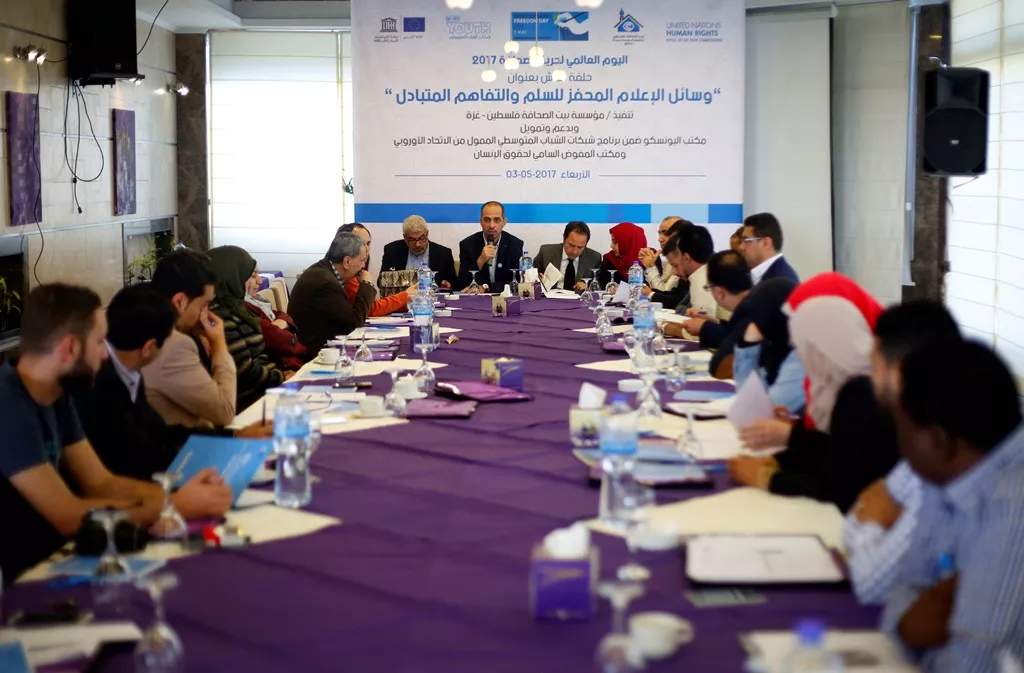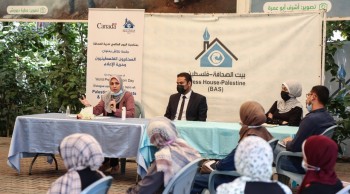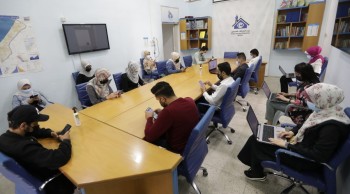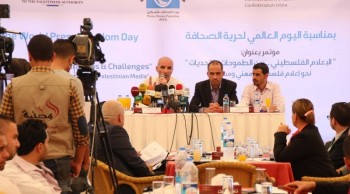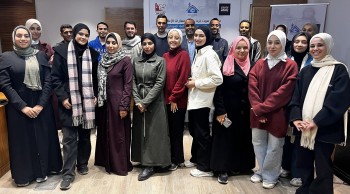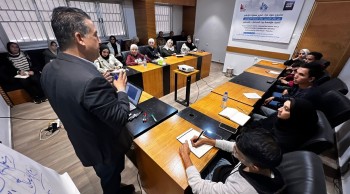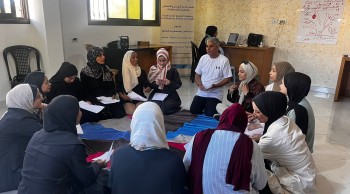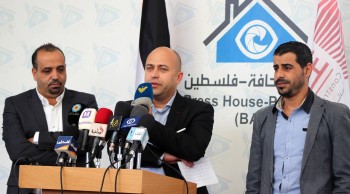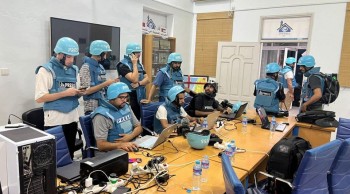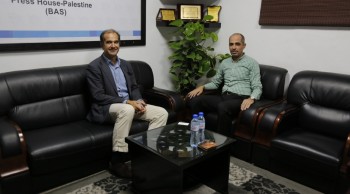Gaza, 03/05/2017--- Press House organized a round-table discussion entitled" Media Outlets is a Peace& Exchangeable Understanding Motivation" in partnership with UNSCO and OHCHR within NET-MED Project, funded by EU and OHCHR on the occasion of the World Press Freedom Day.
The round-table discussion included a number of male and female media workers, writer, political analysts, and fresh journalists.
Belal Jadallah, Chairman of Press House, welcomed the attendees confirming that the World Press Freedom day has come in a time that the Palestinian media suffers from many threatens, including the Israeli occupation who is preventing the truth and depriving them from movement as well as blocking the entrance of security equipment that are required for Palestinian journalists.
In his speech, Jadallah mentioned that tens of journalists paid a high price for delivering the truth to the audience transparently and objectively.
Jadallah stressed on the importance of ending the political division as it has an influence on the media message, which must be professional and objective, hoping that the division can be ended very soon.
In his turn, LODOVICO FOLIN-CALABI, UNESCO respresetative in Palestine, expressed his happiness of Press Freedom Day celebration, adding that UNSCO always seeks to discuss with media outlets about how to defend freedom of expression.
He said that the whole world celebrates this day as today round-table discussion to know how to defend freedom of expression, and how to make journalism professional to support freedom of expression.
He followed:" we want journalism that enhances freedom of expression and overcome the threatens of the new world, as well as achieving professionalism and independency.
He added;" within the increase of the crisis in the Gaza Strip, we need a professional and independent media to cease them."
He noted that media mustn't only be a source of information, but there must be multiple voices and united powers to spread the culture of tolerance and dialogue.
He explained that UNSCO holds in Gaza and West Bank to discuss the curriculums, hoping that they can be developed.
The First Session:-
The first session entitled" The Role of Media Outlets in Spreading Tolerance and Societal Peace", was led by Hanan Al-Masry in participation with the analyst Hani Habib, Dr. Wael Abdel Aal, Head of Information and Communication Technology at the University College, as well as the journalist Majeda Al-Belbesi.
Hani Habib confirmed that media is no longer a tool for dissemination, explaining that media focus on renouncing intolerance and incitement contributes to spreading accepting and enhancing dialogue using a tolerance culture and hate speech prevention.
Habib noted that some media outlets focus on spreading news that spark conflict and hate among people in order to get bigger number of followers, adding that this leads to division and disputes as well as conflict.
He also explained that stopping such outlets through issuing laws contributes to decreasing the negative effects on the societal peace.
Habib Said;" For a tolerant message, media outlets must focus on what encourages unity, as there are many similar values whatever the different opinions and ideologies are.
In his turn, Wael Abdel Aal noted that the role of Palestinian media outlets is dangerous these days as they could increase or decrease the Political division directly, and lead to social division among people. " We witness the transformation of the Palestinian media objectives; they publish promotion messages for their factions instead of delivering the true messages and voices of people about their cause.
He asserted that this reality causes to disruption of media and increase in the hate speech, incitement and absence of "unity and societal peace".
Abdel Aal called all workers of media to learn tolerance and societal peace, adding that the fundamental guarantee of enhancing these values, where committing to journalism ethics is a must for a professional and objective media work.
He asked to raise the awareness of people about the violence and hate speech on social media, and to write an honor document that all Palestinian media organizations are committed to, based on the culture of societal peace and tolerance , as well as incitement rejection.
Abdel Aal also called on the Palestinian media outlets in general and factions in particular not to go with the political speech that incites against each other and to present a united message away from the language of fear and fanaticism.
He added;" we are in need for a media that creates awareness towards the critical national issues that are absent in the Palestinian media view."
In her turn, Majeda Al-Belbesi said that there must be a law that makes all channels and media outlets committed, since the messages that are spread so many people pay a high price for.
Al-Belbesi followed that contribution to publishing awareness is a good possibility especially because people are greatly affected by the channels. " Social media must be controlled through a law that prevents hate speech and incitement." She added
Al-Belbesi noted;" we have to make the public interest a priority instead of the financial profits, as if we have to keep unity and increase peace among the communities."
She also asked the decision makers to create a logical and rational speech, and to present a prize for the media outlet that encourages and spreads tolerance.
The Second Session:-
The second session, entitled" Yellow journalism and Hate speech", was managed by Mr.Majed Terban, Dean of Media college at Al-aqsa University, where Mr.Saber Al-Nerab, Human Right Officer for OHCHR, Mr.Akram Atallah, analyst and Political Writer, and Rola Eleyan, lecturer at University of Palestine were the presenters.
Saber confirmed that human rights issue has got a great attention by media coverage for several factors; many international organizations and authorities add human rights term in their general policies, the existence of the local and international organization of human rights, the increase of the humanitarian crisis and local organizations of human rights, and the increase of human crisis and local& International crisis that are connected with human rights issues.
Al-Nerab explained that freedom of expression is still one of the fundamental basics of developing the democratic societies, adding that the speech of incitement is illegal based on the definitions of freedom of expression, where all whom it may concern fight against it and everything that minimizes the size of freedom of expression practice.
Al-Nerab said;" to let media outlets a positive role in spreading the culture of human right prouects, we have to keep working on achieving the independency of media, raising the level of professionalism in media, finding the appropriate atmosphere for media ethics and standards of media, and to establish training centers to raise the awareness of the youth.
In his turn, the writer Akram Atallah, said; " The hate speech delivered by the bodies that have many possibilities of spreading hate, threatens the development of communities."
Atallah explained that the hate speech was one of the tools that sparked the political division, that's why we can see the speech depends on the political mood.
At the end of his talk, he asked to create a committee of well-experienced journalists to control the published materials and send journalists notes continuously , which is considered as complaint committee.
In her turn, the journalist Rola Eleyan counts on a number of mechanisms to achieve its goals including faking the opinions for the interest of a body, the absence of the reliable resources, counting on private-unknown- imaginary resources for the public opinion.
She added;" In Palestine, we have to realize that the hate speech is part of the Palestinian reality at two levels; the Israeli speech for the Palestinians and the Palestinian hate speech for the Palestinians themselves."
At the end of his talk, she asked to create a media speech based on cooperation, unity and acceptance that enhances the values of tolerance and peace especially on the social media.
Eleyan followed:" we have to devote great efforts to set specific definitions for the hate speech, freedom of expression so that everyone will be aware of such definitions.
The discussion door was opened and the participants discussed many topics with the presenters during the round-table meeting.
The event was concluded with artist performance.

